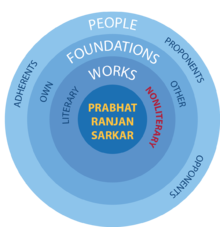Aeshvarya
| Aeshvarya | |
|---|---|
| Short description | Eight occult power gained from the practice of the psychic mystic cult |
| Alternative names | Vibhuti |
| Location in Sarkarverse | |
Aeshvarya (Bengali: ঐশ্বর্য, Devanagari: ऐश्वर्य) or Aeshvaryas), also known as Vibhuti are the occult power gained from the practice of the psychic mystic cult. There are eight Aeshvaryas or Vibhútis.[1]
Description
The meaning of the word Aeshvarya is "occult power". This is one of six attributes of Bhagavan.[2] This is explained in the following verse—[3]
Aeshvaryaiṋca samagraiṋca viiryaiṋca yashasah shriyah;
Jiṋána vaerágyayoshca tu śańńáḿ bhaga iti smrtam.
[Translation: Bhaga is a collection of six attributes: aeshvarya, viirya, yasha, shrii, jiṋána and vaerágya.]
According to Shrii Shrii Anandamurti, these powers acquired through sadhana. Through regular practice of sadhaná, these eight powers can be attained.[3] He told, with with Aeshvarya comes a commanding authority or Viirya, as n impressive personality is necessary in order to perform benevolent deeds.[3]
Eight Aeshvaryas
There are eight aeshvaryas or occult powers—[4]
- Anima: Anima means ability to become very small or small or small enough to enter any physical particle or any crevice of another’s mind (the word "anu" means "small like an atom).[5]
- Mahima: Mahimá means vastness. It means ability to become large (an expanded mind is omniscient, and feels love for the universe).
- Laghimá, to become light (a light body can fly through air, a light mind can study the minds of others);
- Prápti, to obtain any desired object;
- Iishitva, to control (this supreme control may be used to guide others’ minds);
- Vashitva, to psychically dominate others;
- Prakámya, to materialize the desired outcome of events; and
- Antaryámitva, to know the inner thought-wave and the inner need of any entity.
References
- ^ Shrii Shrii Anandamurti "Yatamána, Vyatireka, Ekendriya and Vashiikára" Ánanda Vacanámrtam Part 33
- ^ Shrii Shrii Anandamurti "The Significance of the Word “Bhagaván”" Ánanda Vacanámrtam Part 17
- ^ a b c Shrii Shrii Anandamurti "Svadharma and Paradharma – 2" Ánanda Vacanámrtam Part 16
- ^ Shrii Shrii Anandamurti "In Adoration of the Supreme" Ananda Marga Ideology and Way of Life in a Nutshell Part 7
- ^ Shrii Shrii Anandamurti "Namámi Krśńasundaram" Párthasárathi Krśńa and Bhaktitattva
